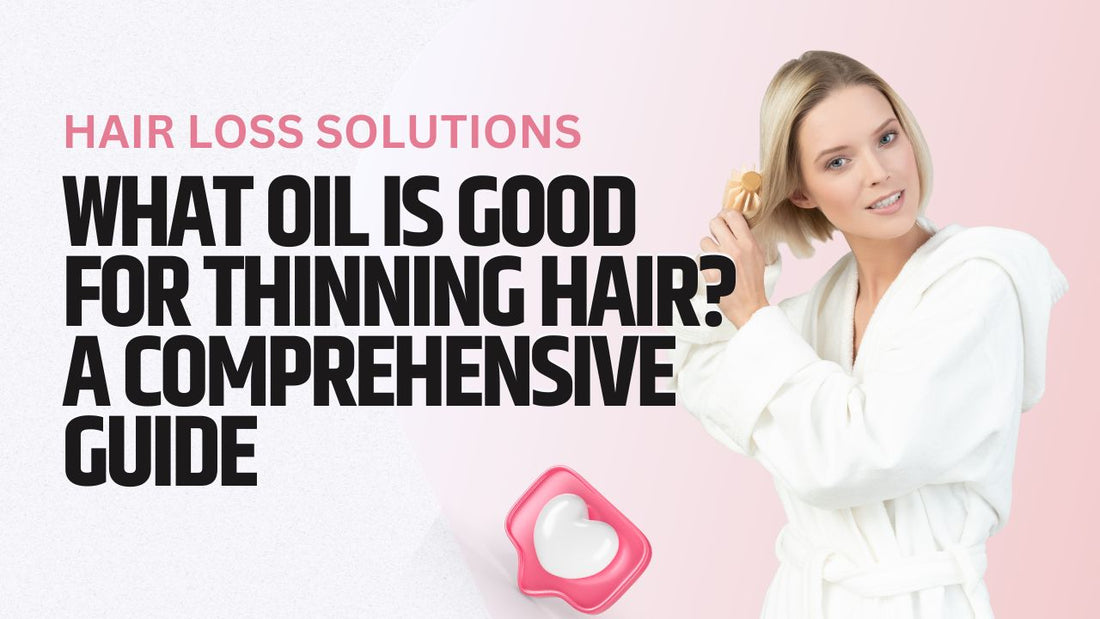
What Oil Is Good for Thinning Hair? A Comprehensive Guide
Share
Thinning hair is a concern that affects millions of people worldwide, impacting both men and women. While age, genetics, and lifestyle factors play a role, the emotional toll can be significant. The condition often leads to a loss of self-esteem, making people exceedingly conscious about their appearance. With the rise of cosmetic and pharmaceutical solutions, many of which carry potential side effects or high costs, natural remedies are gaining attention. Among these, oils derived from plants have emerged as promising contenders for improving hair health and combating thinning. This guide is a comprehensive look at how various oils can provide a much-needed solution to your thinning hair woes.

Understanding Thinning Hair
What is Thinning Hair?
Thinning hair is not just a cosmetic issue; it's a health concern that many people face. It's defined as a noticeable decrease in hair density, where areas of your scalp formerly covered with hair become increasingly visible. This can manifest in different ways—receding hairlines, bald spots, or a general lack of volume in your hair.

Common Causes of Thinning Hair
Understanding the root causes of thinning hair is crucial for effective treatment. Multiple factors contribute to this condition. Aging naturally reduces hair density. Hormonal imbalances, often triggered by menopause or stress, can also lead to thinning hair. Even lifestyle choices such as poor diet and excessive heat styling can exacerbate the problem.
Who is Most Affected?
While thinning hair affects both genders, patterns often differ. Men may experience receding hairlines and bald spots at an earlier age. Women generally notice thinning hair around the parting or crown, and it becomes more prominent post-menopause.

Conventional Treatments for Thinning Hair
Traditional pharmaceutical treatments for thinning hair include medications like minoxidil and finasteride. While they do offer some benefits, these synthetic solutions often come with a laundry list of potential side effects. Scalp irritation, dryness, and further hair loss are common complaints, which is why more people are gravitating towards natural alternatives.

The Role of Oils in Hair Health
Throughout history, oils have been used for various medicinal and cosmetic purposes. In the realm of hair care, oils can play a pivotal role. They offer nourishment directly to the hair follicle, delivering essential nutrients and fatty acids that are often missing from our daily diets. Some oils even possess antifungal and antibacterial properties, creating a healthier scalp environment.

How to Choose the Right Oil
Selecting the ideal oil for your hair type is not a one-size-fits-all endeavor. First, identify the specific concerns you wish to address—be it dryness, lack of volume, or scalp health. Read up on the properties of each oil to find one that targets your issue. Always conduct a patch test before full application to rule out any allergic reactions.
Popular Oils for Thinning Hair
Coconut Oil
One of the most popular oils in both cooking and cosmetics, coconut oil has a lot to offer. It's primarily composed of lauric acid, a fatty acid that deeply penetrates hair follicles.

How to Use
Using coconut oil is simple. Take a small amount and warm it slightly between your palms. Then, massage it into your scalp and along the lengths of your hair. For best results, leave it on for at least 30 minutes before washing it out with a mild shampoo.
What Research Says
Studies show that coconut oil is effective in reducing protein loss in both damaged and undamaged hair. By reinforcing the hair shaft, it can counteract the thinning process.
Olive Oil
Another multi-purpose oil, olive oil is rich in antioxidants and squalene, which is naturally produced by our skin cells.

How to Use
Just a few tablespoons of warm olive oil can be massaged into the scalp and hair. You can either wash it out after 30 minutes or leave it in overnight for more intense hydration.
What Research Says
Studies indicate that the antioxidants in olive oil can help promote scalp health and restore moisture to the hair, making it a viable option for those with thinning hair.
Castor Oil
Known for its thick consistency and strong smell, castor oil is high in ricinoleic acid, a fatty acid that can balance scalp pH, promoting a healthy environment for hair growth.

How to Use
Due to its viscosity, it's often best to mix castor oil with another carrier oil like coconut or olive. Apply the mixture to your scalp and hair, leaving it on for at least half an hour before washing it off.
What Research Says
While there are fewer scientific studies to back up its benefits, the anecdotal evidence supporting castor oil's effectiveness is overwhelming. Many users report thicker, fuller hair after regular use.
Argan Oil
Sourced from Morocco, this "liquid gold" is rich in essential fatty acids and antioxidants.

How to Use
A small amount of argan oil can be applied directly to wet or dry hair to add moisture and shine.
What Research Says
Research confirms its high nutritional value and potential for improving hair elasticity, making it an excellent option for those experiencing thinning hair.
Rosemary Oil
Not just a kitchen herb, rosemary oil has applications in hair care as well. It is thought to improve both hair thickness and growth.

How to Use
A few drops of rosemary oil can be added to a carrier oil and massaged into the scalp. Alternatively, you can add it to your shampoo for a more convenient application.
What Research Says
Clinical studies have compared rosemary oil favorably against minoxidil, a common pharmaceutical treatment for hair loss, making it a natural alternative worth considering.
Spotlight: Proactive Rosemary Hair Booster Oil
In a sea of hair care products, the Proactive Rosemary Hair Booster Oil distinguishes itself as a beacon of innovation and efficacy. This isn't your average oil blend; it's a specialized solution that tackles thinning hair head-on.
Ingredient List: A Symphony of Synergy
This remarkable product features a carefully curated list of natural oils, including Vitis Vinifera (Grape) Seed Oil, Ricinus Communis (Castor) Seed Oil, and, of course, Rosmarinus Officinalis (Rosemary) Leaf Oil, among others. Each of these oils has been selected for their unique properties and scientifically combined in a ratio that optimizes their natural benefits.
The Star Ingredients
- Grape Seed Oil: Known for its emollient properties, it locks in moisture and prevents frizz.
- Castor Seed Oil: Famous for its high ricinoleic acid content, it stimulates blood flow to the scalp.
- Rosemary Leaf Oil: Clinically proven to improve hair thickness and growth, this is the star of the formula.
Why the Ratio Matters
In science, as in life, balance is key. The clinically proven proportions of each oil in the Proactive Rosemary Hair Booster Oil ensure that no single ingredient overpowers the others. This creates a holistic treatment that addresses various aspects of hair health.
Ease of Use: User-Friendly By Design
What sets this product apart even further is its ease of use. Unlike other natural oils, which can be messy or require additional steps for preparation, this blend is designed for hassle-free application. Just a few drops can be added directly to your usual shampoo, making your regular hair-washing routine an enhanced therapeutic experience.
Why It Stands Out: The Convenience Factor
Time is a valuable asset, and this product respects that. There's no need to fiddle with dilution ratios or carry out patch tests. The Proactive Rosemary Hair Booster Oil comes in a ready-to-use format, pre-mixed in clinically proven proportions. It offers a simple, straightforward way to incorporate the benefits of multiple oils into your hair care regimen without the additional steps usually required for natural treatments.
Research Supporting Its Efficacy: The Proof Is in the Potion
While each individual ingredient comes with its own set of research-backed benefits, the Proactive Rosemary Hair Booster Oil combines them in a way that multiplies their effects. The result is a multi-faceted solution that not only arrests thinning but promotes overall hair health. From the increased blood circulation offered by castor oil to the moisturizing properties of grape seed oil, each ingredient plays a crucial role in creating a balanced, effective treatment for thinning hair.
How to Apply Oils for Maximum Benefit
Applying oils to your hair may seem straightforward, but a little technique can go a long way in maximizing their efficacy.
The Right Way to Massage Your Scalp
A proper scalp massage can stimulate blood flow, which can, in turn, encourage hair growth. Using the tips of your fingers, apply moderate pressure and move in small circular motions. Continue this for at least five minutes.
When to Apply: Wet vs. Dry Hair
People debate whether to apply oils to wet or dry hair. Coconut oil penetrates wet hair more effectively, while you can use argan oil on dry hair to control frizz.
Frequency of Application
The frequency of oil application can also impact the results you see. You should use thick oils like castor oil only once a week, while you can apply lighter oils like argan more frequently
Your Essential Guide to Oils: Wrapping Up
In a world where synthetic solutions often fall short and can even exacerbate problems, turning to natural remedies like oils offers not just hope but tangible results for those suffering from thinning hair.
Frequently Asked Questions (FAQs)
Can I mix oils?
Yes, but always conduct a patch test first.
How long before I see results?
It generally takes a few weeks to a few months to see noticeable changes.
Are there any side effects to using oils for hair?
Generally, oils are safe to use, but an allergic reaction is possible.
References
Scientific Studies on Rosemary Oil for Hair Growth: A link to a reputable journal or academic publication that provides scientific evidence supporting the benefits of rosemary oil. https://pubmed.ncbi.nlm.nih.gov/25842469/
Summary
In our exploration of oils beneficial for thinning hair, we have dived into their historical uses, and scientific backing, and even touched upon a standout product in the market. Our aim is to equip you with knowledge and choices, giving you the empowerment to address your hair care concerns effectively and naturally.



















